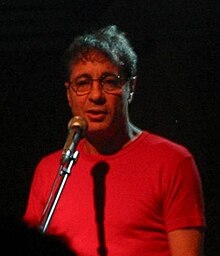| Revision as of 09:54, 4 November 2016 editBender the Bot (talk | contribs)Bots1,008,858 editsm →top: http→https for Google Books and Google News using AWB← Previous edit | Revision as of 22:43, 13 February 2017 edit undoMichelleInSanMarcos (talk | contribs)351 edits →External links - removed the solo link because it goes to an adware site on tripod that has a few lines of text that duplicate parts of this article: ~~~~Next edit → | ||
| Line 102: | Line 102: | ||
| ==References== | ==References== | ||
| {{Reflist}} | {{Reflist}} | ||
| == External links == | |||
| * | |||
| {{Authority control}} | {{Authority control}} | ||
Revision as of 22:43, 13 February 2017
You can help expand this article with text translated from the corresponding article in Hebrew. (August 2015) Click for important translation instructions.
|
| This biography of a living person needs additional citations for verification. Please help by adding reliable sources. Contentious material about living persons that is unsourced or poorly sourced must be removed immediately from the article and its talk page, especially if potentially libelous. Find sources: "Yehonatan Geffen" – news · newspapers · books · scholar · JSTOR (November 2014) (Learn how and when to remove this message) |
| Yehonatan Geffen | |
|---|---|
 | |
| Born | (1947-02-22) February 22, 1947 (age 77) Moshav, Nahalal |
| Nationality | Israeli |
| Occupation(s) | Author, poet, songwriter, journalist, and playwright |
| Spouse | Nurit |
| Children | Aviv Geffen, Shira Geffen, and Natasha Geffen |
| Relatives | nephew of Moshe Dayan |
Yehonatan Geffen (Heb: יהונתן גפן; born on February 22, 1947) also known as Yonatan Gefen, is an Israeli author, poet, songwriter, journalist, and playwright.
Biography
Geffen was born in moshav Nahalal. He is the father of Aviv Geffen, Shira Geffenת and Natasha Geffen, as well as nephew of Moshe Dayan. He has two grandsons.
In 1965, he served as a paratrooper under Matan Vilnaì, and became an officer.
In 1967, his mother overdosed on her medication and died. Geffen considers it to have been suicide.
After his discharge from the IDF in 1969 and moving to Tel Aviv, he took up poetry.
In 1972, while Geffen was studying in London, his sister Nurit committed suicide, causing him to return to Tel Aviv.
During this period he began writing a column for the weekend supplement of Ma'ariv, and he joined the entertainment troupe "Lul" with Uri Zohar, Arik Einstein, and Shalom Hanoch. The latter introduced Geffen to his future wife, Nurit Makober.
Geffen was often criticized for his strong left-wing leanings, which bordered on provocation, and even received death threats. He was one of a group of journalists (including Uri Dan, Yeshayahu Ben Porat, Eitan Haber, Hezi Carmel, Eli Landau, and Eli Tavor) who in 1973 published the book The Failure, the first book to document the Yom Kippur War. It criticized the performance of the government and military and also contained first-hand descriptions of battles, casualties, injuries, and the losses and failures of military hardware. The book aroused considerable public interest.
Much of Geffen's success came from his works for children, like the song "HaYalda Hachi Yafa BaGan" and the book "HaKeves HaShisha Asar" , but he has also written many popular songs, poems, plays, and stories for adults. He frequently collaborated with David Broza, rendering Spanish songs into Hebrew.
References
- Moore, Deborah Dash; Gertz, Nurith (2012). The Posen Library of Jewish Culture and Civilization, Volume 10: 1973-2005. Yale University Press. p. 375. ISBN 9780300135534. Retrieved 9 September 2016.